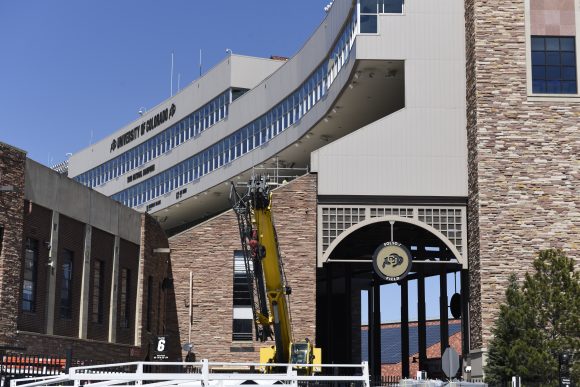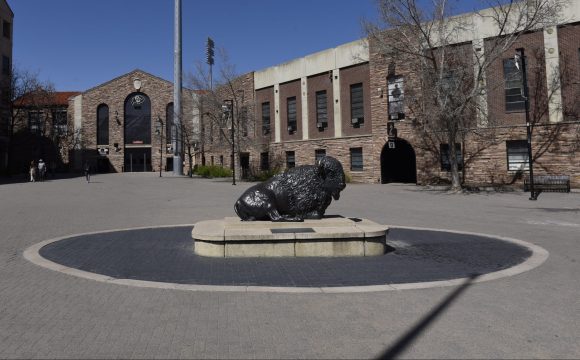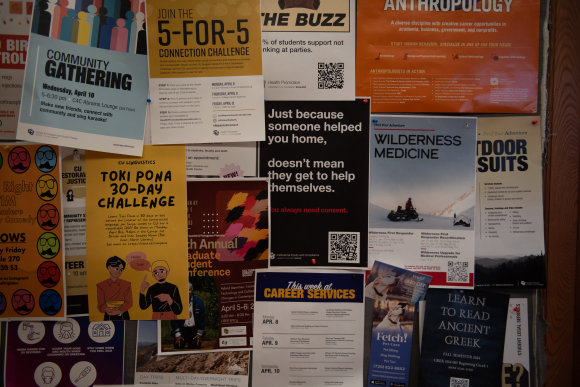
Folsom Field under construction on Tuesday, April 9, 2024. (Ann Marie Vanderveen/ CU Independent)
Editor’s note: This story contains descriptions of sexual violence. On-campus resources for survivors of traumatic incidents are available through the Office of Victim Assistance and the Office of Institutional Equity and Compliance. Moving to End Sexual Assault provides resources for survivors in the broader Boulder area.
In high-profile cases that span more than two decades, the University of Colorado Boulder and its athletics department have faced criticism for the way they respond to and investigate sexual misconduct allegations.
Now, 22 years after a sexual misconduct scandal shattered CU Boulder’s athletics department, recent sexual assault allegations involving university athletes have caught the attention of some campus community members.
Later this year, a CU Boulder Ralphie handler will face a jury trial for two counts of sexual assault and one count of unlawful sexual contact. As the national spotlight again turns towards CU Boulder football, those community members worry the university will shift its attention away from addressing sexual misconduct within its athletics department.
“What students are telling me is that they see some of the same shift or priority of our attention as a campus to our football team,” said Alison Hatch, an associate professor in the sociology and women and gender studies departments.
A spokesperson for the university said it takes all allegations of sexual misconduct seriously.
“Individuals determined to be responsible for violating university policy are held accountable. Results of athletic competition have absolutely no bearing whatsoever on these procedures,” said Steve Hurlbert, CU Boulder’s chief spokesperson.
Erika Krouse, a private investigator-turned-novelist, helped a local law firm investigate one of the university’s highest-profile sexual assault cases that influenced many of CU Boulder’s modern-day sexual misconduct protocols.
“I really do think it’s the culture at large,” said Krouse, who wrote a book about the case, in an interview.
According to Krouse, the university culture at the time “treated women like somehow our experiences are not important and that it’s more important to blatantly support a team and anything they do and that women’s lives don’t matter.”

The buffalo statue titled “Monarch of the Plains” outside Folsom Field on Tuesday, April 9, 2024. (Ann Marie Vanderveen/ CU Independent)
CU’s history with sexual misconduct cases
In 2001, CU Boulder students Anne Gilmore and Lisa Simpson said they were sexually assaulted by active CU Boulder football players and prospective high school recruits at a party.
The women were joined by several others in a suit against the university for violating Title IX, a civil rights law prohibiting sex-based discrimination in educational institutions funded by the federal government. Since the 1990s, the U.S. Supreme Court and the federal government have said sexual assault falls under the umbrella of sex-based discrimination.
A grand jury heard testimony that members of the CU Boulder football team hired prostitutes and strippers as entertainment for parties attended by both active players and recruits. Attorneys for the plaintiffs argued that the university was aware of a “sexually hostile environment” in the football program and was “deliberately indifferent” to it.
The lawsuit against CU Boulder was initially dismissed in 2005 by a federal judge in Denver. The plaintiffs appealed that ruling.
“The case that [Simpson’s] lawyer made is that women are being used as bait to lure players to the school with promises of sex,” said Krouse, who worked as a private investigator on Simpson and Gilmore’s case. “This [practice] was discriminatory against women. It endangered them and therefore meant that they didn’t have the same educational rights as men because they could not safely attend school.”
While this civil suit was making national headlines, Katie Hnida, a former placekicker for the CU Boulder football team, alleged she was raped by a fellow teammate and faced program-wide sexual misconduct.
Hnida said she did not initially report her assault to the police out of fear and eventually left CU Boulder.
Simpson and Gilmore’s case was settled in 2007, with CU Boulder agreeing to pay Simpson $2.5 million and Gilmore $350,000. Baine Kerr, the attorney who represented Simpson, estimated that CU Boulder lost millions of dollars in connection to this case. He said that includes legal fees, settlement costs, PR fees and the financial ramifications caused by a drop in student enrollment.
In a report detailing events that might impact new student enrollment, the university lists that case and surrounding media coverage as one of the potential contributors to an 11.5% drop in new non-resident freshman enrollment and a 5% drop in new resident freshman for the 2004-2005 academic year.
“That document lists a number of events – not just the Title IX lawsuit – that hypothetically may have contributed to lower enrollment and increased tuition costs. There is no data that we currently have, or have ever had, that identifies a direct correlation between any of these events and impacts on enrollment or tuition at that time or any time,” Hurlbert said.
The university president, athletic director and head football coach all left CU Boulder in the fallout from the Simpson case. Some were fired while others chose to leave the program.
As a part of the settlement, CU Boulder agreed to hire a Title IX advisor, a role which the university gave to Nancy Hogshead-Makar, a Title IX expert, attorney and former Olympian.
“There was really no precedent to have somebody like me, who’s very survivor-oriented, to be able to go and work with a billion-dollar institution to assure that best practices were being followed,” Hogshead-Makar said. She served in the position from 2008 to 2013.
Hogshead-Makar was responsible for overseeing the university’s progress in survivor support and sexual assault prevention.
“[Before my arrival] there was an expectation of protecting the football and men’s basketball program at the expense of women,” Hogshead-Makar said.
In addition to appointing her, the university agreed to substantially increase the Office of Victim Assistance’s budget and fund two other counselor positions within the Title IX office.
“At that time, [the University of] Colorado recognized that they did not ever want this to happen again,” she said.
Despite the court-mandated reforms and internal changes, sexual assault committed by students affiliated with the athletics department at CU Boulder would remain a persistent issue through the coming decades.
The athletics department makes headlines once again
In 2013, CU Boulder was one of 55 schools the Department of Education investigated for their handling of sexual misconduct cases. The department’s review of the university concluded four years later with “no adverse findings.”
In 2014, while the university was actively under investigation, Kendra Heuer, then a freshman at CU Boulder, was raped by then-Ralphie handler Austin Wilkerson. This case would again put the university back in the national spotlight.
Wilkerson was convicted and ultimately admitted to sexually assaulting Heuer. He was sentenced to two years of a work release program and 20 years to life on probation. That sentence – and his subsequent early release – sparked backlash from those who believed his punishment was too lenient.
While Heuer said the university made an effort to maintain space between Wilkerson and herself during the investigation, she was frustrated Wilkerson stayed on the Ralphie handler team during this time.
“CU made sure we didn’t have any classes together and he couldn’t be around me but … he was still running a Ralphie game when he was under investigation,” Heuer told the CU Independent.
Policy changes
After Wilkerson was convicted, the CU system created a slew of new policies around sexual misconduct.
The Office of Institutional Equity and Compliance was created in 2014 by combining two related university departments. That new centralized entity was tasked with investigating and addressing any conduct that occurred on campus violating CU Boulder’s policies.

Flyers posted in the Hale Science Building on Tuesday, April 9, 2024. (Ann Marie Vanderveen/ CU Independent)
After a report or complaint of sexual misconduct has been received and deemed within OIEC’s jurisdiction, the office’s investigators can launch a formal grievance process that determines whether an individual violated university policy. Led by the university’s Title IX coordinator, OIEC can also issue sanctions against responsible parties and, on rare occasions, expel or suspend students.
OIEC started publishing case resolution data during the 2015 to 2016 school year when it received 187 complaints against students for sexual misconduct, discrimination and harassment. The latest available data, from 2022 to 2023, reported 252 allegations of sexual misconduct against students.
“When OIEC was formed, prevention education was identified as a key need to be expanded on campus to increase awareness and build skills to reduce problems,” Hurlbert, the university spokesperson, said. “We believe our concerted efforts and the broader concerns about sexual assault throughout the country in response to the ‘Me Too!’ and ‘Times Up!’ movements influenced reporting rates.”
Ashlyn Hare, an attorney at the Boulder-based law firm Hutchinson Black and Cook, which represented Lisa Simpson’s case against CU Boulder, said the university has gotten better at responding to harassment and violence, but that doesn’t mean all CU Boulder’s problems with sexual misconduct have been solved.
“A lot of harassment and assault goes on on college campuses and, frequently, the Title IX departments are understaffed and they can’t respond and investigate and handle these situations as quickly as one would hope that they would,” Hare said. “... The law and those systems are only as beneficial as culture allows them to be.”
In 2015, the university system broadened its official sexual misconduct policy to include intimate partner abuse and gender-based stalking. It also mandated that campus employees in supervisory or advisory roles report any instances of sexual misconduct brought to their attention.
The university also formally defined the role of the Title IX coordinator on campus. In addition to handling sexual misconduct reports in a timely manner, the coordinator is now responsible for presenting annual data reports of complaints and outcomes to administrative officials.
CU Boulder also created its first-ever sexual misconduct survey in 2015, which it sent to all students. It found that 28% of undergraduate female respondents said they had been sexually assaulted.
“At that time, we invested heavily in increasing awareness of reporting and addressing the barriers to reporting in our outreach and educational efforts,” Hurlbert said.
In 2021, CU Boulder conducted the survey for the second time, finding fewer reports of sexual misconduct but an increased severity of specific incidents. The university’s Sexual Misconduct Task Force, formed in September 2022, analyzed the survey data and issued several recommendations.
“The [task force’s] charge does not include directly proposing modifications to university policy,” wrote a spokesperson for the task force in a statement. “Instead, the focus of the task force is on broadening and enhancing effective prevention strategies to promote a safer campus atmosphere.”
Recent troubles within the athletics department
In December 2022, national attention was drawn to CU Boulder’s football program once again when the university announced it hired Deion Sanders as head coach.
“We've always been a football school to some extent, but it is only recently that we've been a football school in the same way that we were in the early 2000s [and 1990s],” said Hatch, the women and gender studies professor. She teaches a unit on Krouse’s book in her class on violence against women and girls.
“I hear students say … they're a bit concerned about some of these things that happened so long ago repeating themselves, not necessarily because we have evidence that's happened, but because we've got the same framework again; we've elevated some students to kind of a celebrity status,” Hatch said.
Early on in Sanders’s time at CU Boulder, allegations of sexual misconduct against a football player surfaced again.
When wide receiver Anthony “Deuce” Roberson II committed to CU Boulder in December 2022, he was already under active investigation by law enforcement in El Paso County for allegations related to sexual misconduct.
A CU Independent investigation found that at least 14 women said he sexually assaulted, raped or harassed them during his years in high school and junior college.
In January 2023, a petition was created by CU Boulder student Jenna Baker, urging the university to expel Roberson and hold him accountable.
“The response that we got from CU was straight-up silence,” Baker said. “Which I thought was disheartening for me and the dozens of victims, including at least a handful of current CU students, who directly contacted administrators and recounted traumatic and graphic experiences in hopes that they could protect future victims.”
More than 5,000 people signed the petition and, as of April 2023, Roberson was no longer a member of the CU football team. University officials also barred Roberson from campus.
In April, CU Boulder hired Warren Sapp as a graduate assistant coach. Sapp was arrested for assault and solicitation of a prostitute in 2015 and for allegedly assaulting his girlfriend months later. He took plea deals in both cases.
“It seems that especially when perpetrators are judged by CU to have value to the university's image, like a star football player, justice seems to fall short as well as that transparency piece to protect other students on campus,” Baker said.
Responses from CU students
Two decades after Simpson’s case, a new generation of students and recent graduates say they’re working to make campus a safer place for victims of sexual misconduct. But it’s an uphill battle.
Eswari Duggirala, a co-founder of CU Boulder’s Students Against Campus Sexual Assault, said they believe the university is willing to turn a blind eye to instances of sexual misconduct as a means of protecting the athletic department’s reputation.
“I think we have to remember that for universities, especially like CU Boulder, athletics is such a huge part of the college culture. So when there is a sexual assault case, it obviously paints the athletic department in a bad light,” Duggirala said. “And the university never wants to be painted in a bad light … for [the university], it's easier to protect the perpetrators than to really dig into what's really going on.”
In the recent case involving Brennan Pieper, the Ralphie handler accused of sexual assault, the university says it’s followed federal law and university policy during its investigation.

The statue in Champions Plaza outside Folsom Field on Tuesday, April 9, 2024. (Ann Marie Vanderveen/ CU Independent)
None of the university actions taken against Pieper, who currently faces sexual assault charges, have impacted his ability to participate as a member of the athletics department. During the fall 2023 football season, Pieper ran alongside the university’s mascot at Folsom Field and appeared at other university-sponsored events, like the Pearl Street Stampede.
“Title IX regulations … dictate that schools and universities cannot unreasonably burden, punish, or discipline an accused student prior to the completion of a formal grievance process,” Hurlbert, the university spokesperson, said. “A safety and risk analysis must be done to determine if an immediate threat to the physical health and safety of any student justifies removal on an emergency basis.”
Baker, the student who created the Roberson petition, echoed Duggirala’s sentiment that the university should prioritize the safety of survivors over its reputation.
She hopes the university acknowledges the challenges of the past when looking toward the future.
“I absolutely think it's important to reconcile the past to begin to move forward and to take accountability for past missteps. I think that a sign of a healthy administration is admitting mistakes and being willing to have a vulnerable conversation about steps to move forward that includes the victims directly,” she said.
Contact CU Independent Managing Editor Jessi Sachs at jessica.sachs@colorado.edu.
Contact CU Independent News Editor Ann Marie Vanderveen at ann.vanderveen@colorado.edu.
Contact CU Independent Assistant News Editor Lucy Adlen at lucy.adlen@colorado.edu.
